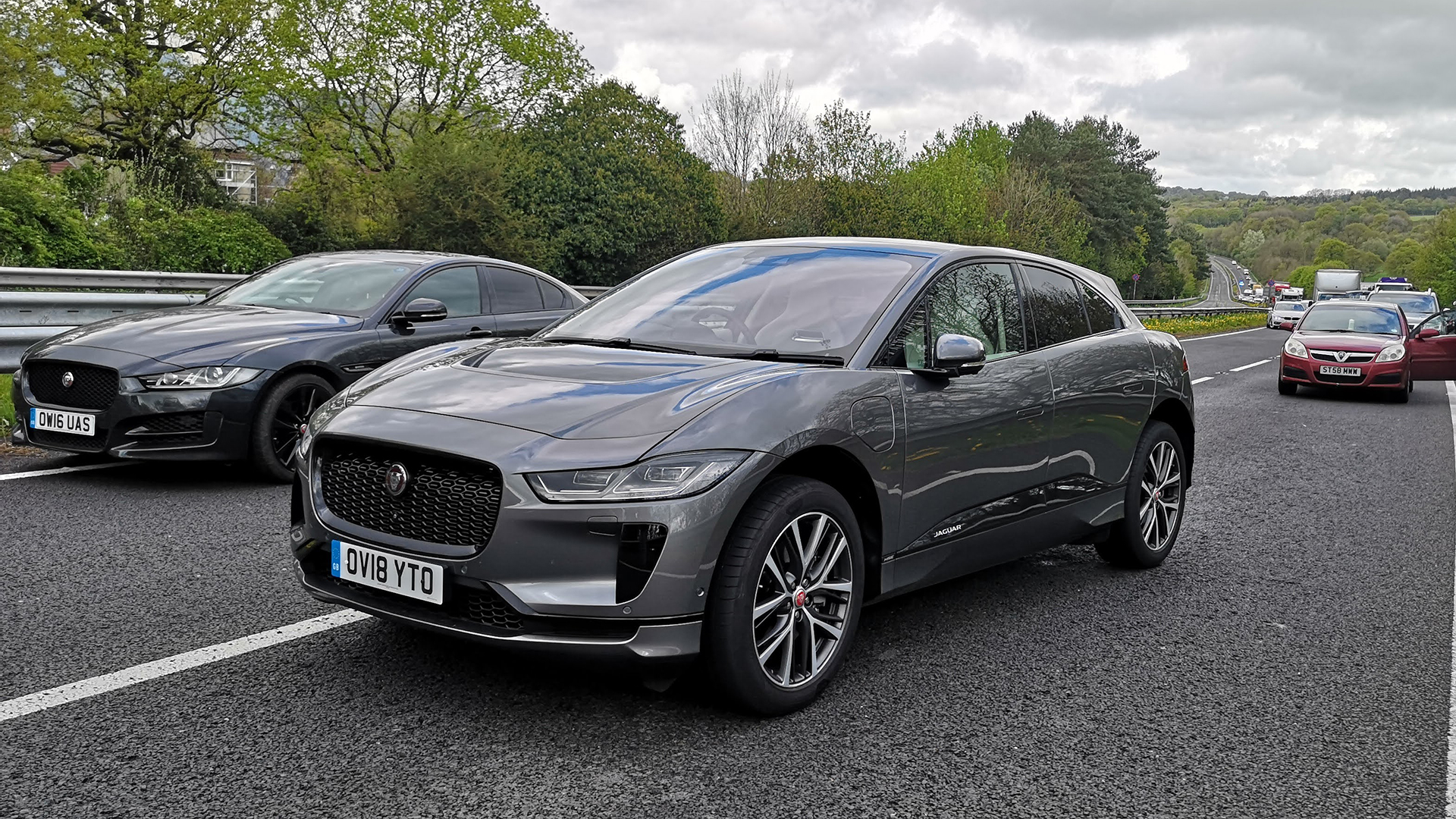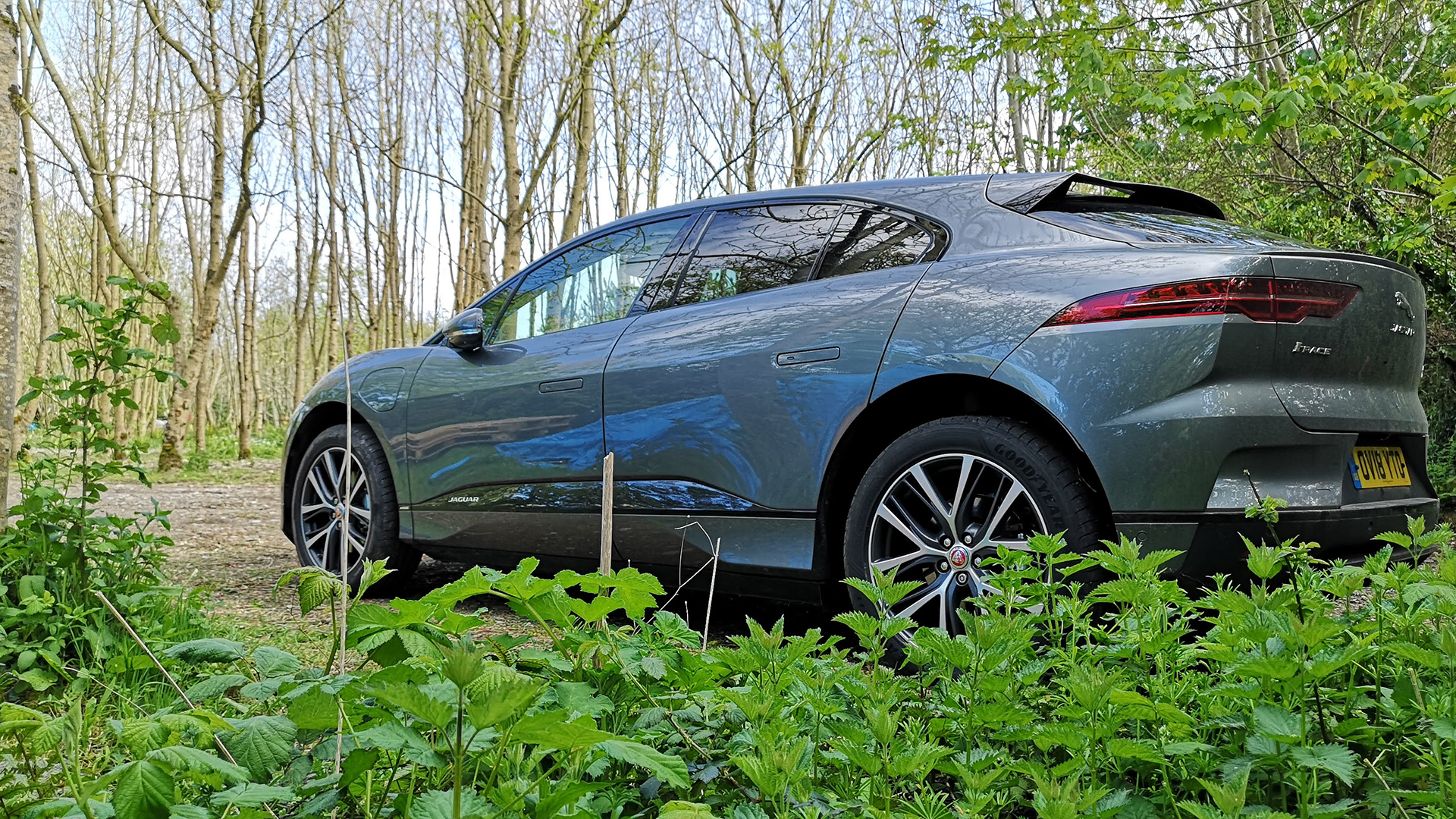Jaguar I-PACE: pushed to Lands End and back again, all with an app
Pushing the car to its long-range limits

Sign up for breaking news, reviews, opinion, top tech deals, and more.
You are now subscribed
Your newsletter sign-up was successful
Want to drive your car all the way to the tip of the country on electricity alone? There's an app for that. Of course, what we didn't count on was a hay bale fire in the road, no charger at our destination and doing it all without a mirror. The electric adventure is very much here and now.
The plan was to take the all-electric Jaguar I-PACE from London, over 300 miles, to Lands End in Cornwall. Can that be done quickly using fast chargers? Can you just hop in and go without a tap-to-pay electric charging station card? And can the car actually do all that while you stay comfortable? These were a few of the questions that pushed us to test this car to its long range limits.
When we got in the car, we thought this electric Jag would banish fuel cars to the past, but we didn't expect to never look back literally. But as we adjusted the rear view mirror it dropped out of the car – no looking back at all then. It spent the rest of the journey in the glove box.
While this was a minor fault, it planted the seed of doubt about an already relatively new type of car. We expected the range meter in an electric car to be inaccurate but now obsessed over always having plenty of spare charge and, it turns out, with good reason.

The electric adventure plan
So we got the Polar Instant app, which helps you use the BP-owned Chargemaster UK network of juice-up stations. The app has a handy map that lets you filter by charger type. So, based on the trip distance, the plan was to stop near Stonehenge to top up at the Holiday Inn, Salisbury. That was about a 75-mile journey and we started out near fully charged, which the car said was 235 miles. On arrival we had 58% charge left in the car (nearer the 100-mile mark).
The goal was to see if you could buy an electric car like this, but still go on long trips where no distance would be too far. With a claimed I-PACE range of up to 292 miles on a charge of the 90kW battery, this seems possible.
The UK has plenty of charging stations dotted along main roads and these can all be easily found using the Zap-Map app. But we wanted to use fast chargers only, to take advantage of the I-PACE 150kW CCS port that claims to give you up to 168 miles of charge in one hour. And we wanted to do this using only an app to pay.
Sign up for breaking news, reviews, opinion, top tech deals, and more.
The issue was that on our route down to the south west there are only regular 50kW CCS chargers. In fact in all the UK we could only find one or two 150kW stations up round Leeds way.

Is it easy to charge the I-PACE long range?
Thanks to the wonder of the Polar Instant app, we found the charging station easily, and the detail was so great that even finding the space where the charging bays were located was a doddle. We opened the app, plugged in the 50kW CCS charger cable, which is attached to the unit much like a petrol station, then waited for it to start. And waited. And needed to pee, so hopped and waited.
In the end we had to call the number on the unit, wait on hold for 10 minutes (hopping) then speak to someone who helpful reset the charging station. After a long reboot we were up and charging which meant a run into the hotel to use the loo, grab a hot drink and check some emails. An hour later we emerged to a nearly fully charged car with well over 250 miles in the battery tank and a 150 mile journey ahead to Bovey Castle in Dartmoor.

Unexpected power drains
After a steady journey past Stonehenge and onward into the depths of Devon a lorry full of hay caught light in front. The hay fell and the road was ablaze. The road was shut behind and in front as fire engines and support crews arrived. It was clear this was going to be a long hold up. In all it took a good three hours. Ideal time to test the rear seats, which were comfy to lie down across and look out of the clear roof to the skies above. Comfy enough, it turns out, to sleep on too. The car was left off to save battery as it was now on 148 miles. Luckily there was no need for the heater to be running.
That time allowed for some number-crunching which revealed the car was off by about 10 miles per 100 miles on the range. There was no air con on, or lights, only music. The roads were quite undulating to be fair but even at the speed limit the range should be a bit more accurate than that. Perhaps the car was erring on the side of caution and saying it was depleting faster than it actually was.
Either way, the Bovey Castle destination only had a 3kW charger, so it would take a good overnight 12 -hour charge to get back to full, so keeping some in the tank seemed prudent in case a dash to a nearby charging station was needed. We arrived with just 81 miles left in the tank and a charger problem.

The long night
After a three-hour delay, one hour charge wait and several hours on the road, the site of the Bovey Castle hotel – as you wind up a country lane with a golf course backdrop – could not be more welcome. The stylings of the former castle fitted perfectly to compliment the I-PACE. In fact, it was amazing how an old building and an ultra modern electric car could look so perfect next to each other. What wasn't so perfect was the charger – it was broken.
We had to settle for a wall socket, which the car reckoned would take 27 hours to get to a full charge. We had a good 14 hours overnight, so plugged it in and hoped for the best. The hotel kindly put on a massage at its Elan Spa and a stunning three-course dinner at the triple AA Rosette winning Great Western restaurant, which was all well needed after that journey. When investing in an electric car, bear in mind there may be more costs needed to help make the experience more pleasurable.
That said, this was a great way to travel, it makes you plan ahead a bit more and slow down your deadlines so you're not in a rush. All in all that makes for an ideal holiday mood on arrival, which helps enhance the enjoyment of the hotel more. In fact an early morning stroll around the stunning grounds was something that happened where it might not usually, since this meant a bit more charging time before setting off. With 170 miles in the batteries, it was time to head south.

The end of the country
To get from Dartmoor to Lands End directly is a 111-mile journey. Despite a spare 79 miles in the car, previous experience taught that doing it in one was a risk. Also there are no high speed Polar Instant charging stations down at the bottom of Cornwall, so the range needed to be enough to get there and a bit of the way back. A stop at the iconic Headland Hotel (as featured the movie The Witches, from the Roald Dahl book) was needed for a high-speed charge. That wasn't far out of the way and meant a nice stroll along Fistral beach was an option.
Once again the need to charge meant spending a bit more time on the beach to make sure the car had even more juice. The result was a forced relaxing into the situation which ultimately leaves you feeling more calm when you get back on the road. It really is a great way to drive long-range – it feels like a pleasure and all part of the trip rather than a chore to be gotten out of the way. The irony of a new type of car reviving an old style of driving was not lost.
The roads to Lands End were hilly, rain-filled and busy. Despite a lot of stop-starting, the destination was finally reached and with plenty of charge to spare. It's funny though how things like headlights, wipers, heaters and music all become extra battery drains in your mind when you're driving to a tight range.

Cheat charge
The mission was to do this journey all on Polar Instant high-speed chargers only, plus hotel. Since it was camping the second night, that wasn't an option. Going back to Newquay was a faff, so instead the car was left in the Penzance Sainsbury's, which offers free charging on a 3kW station. That meant a long slow charge to get enough power for the trip back up to a charger the other side of Dartmoor.
As a result the day was spent walking to St Michael's Mount and working in a great coffee shop with a fantastic view. None of that would have happened if it wasn't for the need to stop and charge. Technically, the car was filling up as we were working and actually making money. What car do you know that makes you money to fill up?

The last leg
The final run meant a stop at a farm shop just past Exeter before pushing on to Salisbury for a late night charge and a sandwich there. Technically, in terms of range, the journey could be done without that stop but after realising there is a lot of uphill climbing on the way back it was a good choice to plan a stop. It also meant discovering a great little farm shop with mini diggers for the kids to play in. Plus it meant chatting to another charging station user and feeling a human connection you're not likely to get at a regular petrol station.
When home the worry of running out of power was gone and the car could be pushed a bit. It's fast. Really fast. Like 0-60 mph in 4.5 seconds fast. All that torque kicking in at once flings you back into your seat and the handling, unlike a certain American all-electric car, is actually really good for the size of the vehicle. In short it's a lot of fun to drive, more so than most petrol cars, in fact.
So you can do long journeys in an electric car and you can do them for cheap. The charging station costs a few pounds (or dollars) each time and you do have to plan more time for stops, but the stops are good. They make you relax, enjoy the trip and – it turns out – learn to enjoy life more by slowing down. But, in this case, that's slowing down without the need to sacrifice super speed bursts when you want them.
Luke is a freelance writer and editor with over two decades of experience covering tech, science and health. Among many others he writes across Future titles covering health tech, software and apps, VPNs, TV, audio, smart home, antivirus, broadband, smartphones, cars and plenty more. He also likes to climb mountains, swim outside and contort his body into silly positions while breathing as calmly as possible.
